Weekly Exhibition Walkthrough
EXITS EXIST
Apr 01, 2022 - Jul 09, 2022
Free admission, reservations required
Join us for an introduction to Exits Exist, an exhibition by San Francisco-based Barbara Stauffacher Solomon, including site-specific supergraphics for the Graham Foundation’s Madlener House galleries along with works on paper, artist's books, and a new series of sculptures. Tours are led by Graham Foundation staff and invited guests.
Friday, 12-1 p.m.
July 1 and July 8
REGISTER HERE
Saturday, 2–2:30 p.m.
July 9
REGISTER HERE
Last Thursday of the month, 6:30–7 p.m.
June 30
REGISTER HERE
Group tours are available by request, contact us at info@grahamfoundation.org

Casting Lessons
Joshua G. Stein
Mar 05, 2020
(6pm)
Talk
Please RSVP
As the once distant concerns of extraction and scarcity become more immediate, a direct engagement with the unruly behavior and associative potential of base materials can offer architects a training ground for addressing these same issues at larger scales. Joshua G. Stein will present his research on casting techniques and the recuperation of traditional craft into architectural digital fabrication: “Casting Lessons” examines how material technique might offer methods for grounding the often disembodied discussions around digital form making, historical style, and urban datasacapes.
Joshua G. Stein is the founder of Radical Craft and the codirector of the Data Clay Network (www.data-clay.org), a forum for the exploration of digital techniques applied to ceramic materials. Radical Craft (www.radical-craft.com) is a Los Angeles-based studio that advances an experimental art and design practice saturated in history, archaeology, and craft. Stein is author of Trajan’s Hollow (ORO Editions, 2019), which examines the role of craft and reproduction in the era of digital scanning and fabrication. He is Professor of Architecture at Woodbury University where he also directs the Institute of Material Ecologies (T-IME). He is the 2019–20 Mitchell Visiting Professor of Architecture at the School of the Art Institute of Chicago.
Image: Installation view of "Trajan’s Hollow," American Academy in Rome, 2011. Courtesy the artist. Photo: Michael J. Waters
For more information on the exhibition, Poured Architecture: Sergio Prego on Miguel Fisac , click here.

Whitney Johnson
Feb 22, 2020
(8pm)
Performance
RSVP required
Tonight Whitney Johnson (aka Matchess) premieres Huizkol for viola, tuning forks and electronic instruments. The new work is an opportunity to engage with our own skepticism and belief in the effects of sound on the body.
Huizkol proceeds in seven small movements, or what Johnson calls “updrafts,” introducing sonic disequilibrium into the quad space of Madlener House. Low binaural sine waves rise and fall, tuning forks beat symmetrically (performed by forkists Kalina Malyszko and Havadine Stone), organ builds cluster chords, and tape-layered viola just intones. A VHS projection of colored light follows the same frequency arc as the sound.
Johnson finds inspiration and her title in the poetry of Anne Carson. She explains:
“In ‘The Wolf God,’ Carson consults with a community of women about the plight of lupine ears. Although wolves’ hearing is sharp enough to sense a cloud passing overhead, sometimes the wind will blow a seed into the aural canal. Losing equilibrium, mortal wolves go mad trying to stand upright; they die of anger. Only one—Huizkol—learned to survive disequilibrium.”
He took small steps at first.
Using the updrafts.
They called him Huizkol,
Whitney Johnson (b.1981, Clearfield, Penn.) is a musician, composer and writer living in Chicago. She performs with the viola, as well as combo organ, electronics and voice. As Matchess, she interprets the unknown with sound. Her techniques reproduce meaning through a range of historical material processes, including reel-to-reel tape looping, cassette tape sampling and field recording. In the Matchess Trilogy (2013-2018), Johnson used the limited palette of a 1960s Ace Tone combo organ, an analog Rhythm Ace drum machine, viola and voice to craft a sound collage of transient songs on a bed of ambient noise. She has recently collaborated in improvised and composed settings with Circuit des Yeux, TALsounds, Brett Naucke, Gel Set, Lia Kohl, Macie Stewart, Matt Jencik, Couteau Sang, Lea Bertucci and Sarah Davachi. In tandem with her music practice, she received her doctorate in the sociology of sound from the University of Chicago in 2018, writing a dissertation on the cultural value of embodied sensory perception, particularly in the discipline of sound art.
Whitney Johnson’s first Lampo appearance was in April 2018 with Sarah Davachi.
Since 2010 the Graham Foundation has supported and partnered with Lampo to produce this performance series held at the Madlener House. Lampo, founded in 1997, is a non-profit organization for experimental music and intermedia projects.
Artist Talk: Johnson discusses her new and recent works Huizkol (2020) and Fundamental 256 Hz (2019) and the limits of sound healing. She also reviews other examples of sound and its purported effects on the body. For instance, brainwave entrainment techniques claim to coax the mind into states of awareness through exposure to binaural beats. At the extreme, in 1936 American inventor Royal Raymond Rife maintained his beam ray clinical instruments would explode the “BX Virus Carcinoma” and other pathogens by producing resonant frequencies at their “Mortally Oscillating Rates.” Johnson extends the talk to her experience working at La Monte Young and Marian Zazeela’s Dream House in New York City. Lampo Annex, Monadnock Building, 53 W. Jackson Blvd. #1656. Friday, February 21, 6pm. RSVP HERE.
Image: Courtesy the artist. Photo: Alison Green

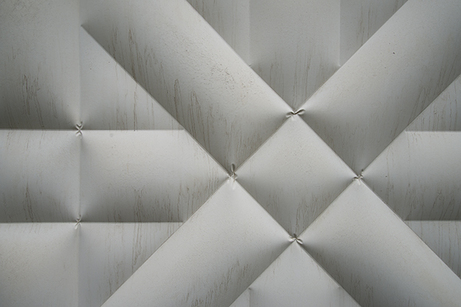
Poured Architecture: Sergio Prego on Miguel Fisac Opening Reception
Sergio Prego with Patxi Eguíluz, Carlos Copertone, and Iker Gil
Feb 11, 2020
(5:30pm)
Opening Reception
Please RSVP
5:30 p.m. Comments by artist Sergio Prego with curators Patxi Eguíluz, Carlos Copertone, and Iker Gil
6:00–8:00 p.m. Opening reception
Please join us for a reception and introductory remarks to celebrate the opening of our winter exhibition Poured Architecture: Sergio Prego on Miguel Fisac.
The exhibition Poured Architecture establishes a dialogue between the late Spanish architect Miguel Fisac and the contemporary work of the Basque-born, Brooklyn-based artist Sergio Prego. Through a new body of work supported by a Graham Foundation Fellowship, Prego explores the possibility and synchronicity of materials and processes across architecture and visual art in a new series of sculptures and drawings inspired by Fisac’s innovative architecture and construction techniques. Here, Prego plays with scale and texture and creates his pneumatic and concrete structures within the context of Fisac’s methodology—chiefly arquitectura vertida (poured architecture), the patented cast concrete system that Fisac created. Drawings by Prego, displayed alongside facsimiles of material culled from Fisac’s archive, further illustrate the confluence of the two practices that both employ themes of material fluidity and malleability and investigate using materials such as plastic, concrete, and aluminum. This exhibition invites a multifaceted conversation about architectural imagination, experimentation, and material expression.
Sergio Prego (b.1969) is a Basque artist, part of the experimental 1990s Artelekuproject in San Sebastián, and is currently based in Brooklyn. His mainly sculptural practice embraces a sensitive approach to materials and technical strategies while maintaining the presence of the hand of the artist. Among his most celebrated projects are Primer Proformaat the MUSAC in León (2010) together with the artists Txomin Badiola and Jon Mikel Euba, the experimental pedagogical project Kalostra(2015) in San Sebastián, and the Spanish Pavilion of the Venice Biennale (2019) with the artist Itziar Okariz.
Miguel Fisac (1913–2006) was a key figure in Spanish architecture of the second half of the twentieth century and his works contributed to the modernization of architecture in Spain. He graduated from the School of Architecture of Madrid in 1942, and his first work, the Church of the Holy Spirit, was completed that same year. He was awarded the Gold Medal for Spanish Architecture (1994) and the National Architecture Award (2002).
Carlos Copertone received his PhD from the University of Extremadura, specializing in urbanism and regional planning. He is an editor of books on art and architecture at Caniche Editorial and has curated and developed several exhibitions, programs, and projects with Spanish cultural organizations. Copertone has lectured extensively in Spain and abroad and has been published in MAS Context, Openhouse, and Architectural Digest.
Patxi Eguíluz is an architect, curator, researcher, and critic focused on construction and urbanism. He is an editor of books on art and architecture at Caniche Editorial and has curated several exhibitions and developed projects at various institutions across Spain. His writing has been published in MAS Context, Openhouse, and Architectural Digest.
Iker Gil is an architect and director of MAS Studio, an architecture and urban design firm based in Chicago. He is also the editor-in-chief of the journal MAS Context and editor of the book Shanghai Transforming (ACTAR, 2008). He has curated exhibitions for the Chicago Architecture Biennial and the US Pavilion, Venice Architecture Biennale. Additionally, he is the executive director of the SOM Foundation and teaches at the School of the Art Institute of Chicago.
Image: Detail of the facade of Iglesia de Nustra Señora del Carmelo (Church of Our Lady Flor del Carmelo), Madrid, designed by Miguel Fisac, 1983. Photo: Carlos Copertone
For more information on the exhibition, Poured Architecture: Sergio Prego on Miguel Fisac , click here.

Emmanuel Pratt
Sweet Water Foundation
Jan 09, 2020
(6pm)
Talk
Please RSVP
Join us for a talk by urban designer Emmanuel Pratt, recently named a 2019 MacArthur Fellow, as he discusses his approach to growing historically redlined neighborhoods through community-driven initiatives and shares current and upcoming projects.
Emmanuel Pratt is cofounder and executive director of the Sweet Water Foundation. His work explores architecture, urbanization, race, identity, gentrification, art and social praxis, and transformative processes of community economic development through intersections of food security and sustainable design innovation. He was a Loeb Fellow, Charles Moore Visiting Lecturer at Taubman College or Architecture and Urban Planning at the University of Michigan, and is currently a visiting lecturer for Environmental and Urban Studies at the University of Chicago.
Sweet Water Foundation practices regenerative neighborhood development, a creative social justice method, that creates safe and inspiring spaces by establishing healthy, intergenerational communities that transform the ecology of once-“blighted” neighborhoods. The Foundation utilizes a blend of urban agriculture, art, and education to transform vacant spaces and abandoned buildings into economically and ecologically productive and sustainable community assets that produce engaged youth, skilled workers, art, locally-grown food, and affordable housing. These principles are realized in the flagship Foundation project, the Perry Avenue Commons, encompassing approximately three acres on the South Side of Chicago.
Image: Re-Root + Redux, Perry Ave Commons, Sweet Water Foundation, Chicago, IL. Presented in conjunction with the 2019 Chicago Architecture Biennial.
For more information on the exhibition, Tatiana Bilbao Estudio: Unraveling Modern Living, click here.

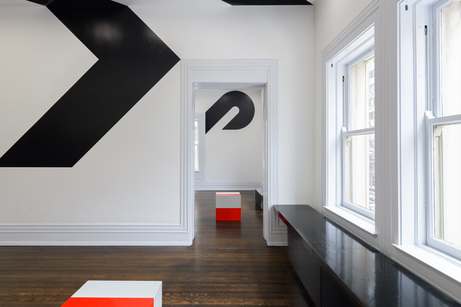
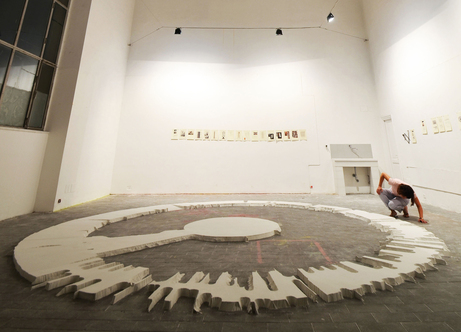
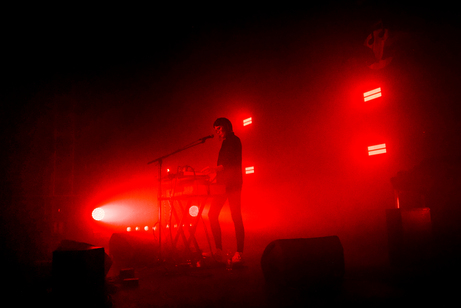

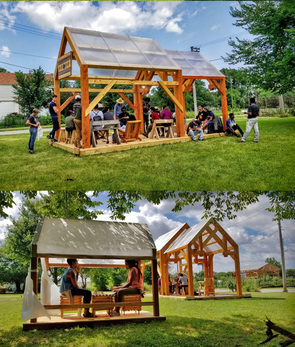
 PREVIOUS POSTS
PREVIOUS POSTS